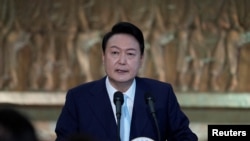Less than a day after North Korea test-fired an unprecedented eight ballistic missiles, South Korea and the United States returned the favor, launching eight of their own missiles into the sea off the east coast of Korea.
The retaliatory launch is the latest sign that South Korea’s new conservative president, Yoon Suk Yeol, will respond more quickly and firmly to North Korea’s missile tests and provocations.
It represents a change in approach from that of former South Korean President Moon Jae-in, who scaled back public displays of military strength in an effort to reduce tension and preserve the chances of talks with the nuclear-armed North.
Some analysts fear Yoon may become locked in a dangerous cycle of provocations, giving North Korean leader Kim Jong Un added justification to conduct bigger weapons tests. But others say a firm U.S.-South Korean response is necessary to deter North Korean attacks and reassure allies who depend on U.S. protection.
‘Peace through strength’
On Sunday, North Korea fired eight short-range ballistic missiles into the sea over a 35-minute period, South Korea’s military said, continuing one of Pyongyang’s most active years ever for missile testing.
In response, the South Korean and U.S. militaries held a combined live-fire exercise early Monday involving seven South Korean missiles and one U.S. missile. The drill demonstrated the “capability and posture to launch immediate precision strikes on the origins of provocations and their command and support forces,” South Korea’s military said in a statement.
“Our government will respond firmly and sternly to any North Korean provocation,” Yoon said later Monday during a ceremony to mark South Korea’s Memorial Day. “We will make sure there is not a single crack in protecting the lives and property of our people.”
Yoon, who often criticized the left-leaning Moon’s attempted dialogue with North Korea as dangerous and naive, has called for a policy of “peace through strength.” He supports not only continuing South Korea’s military buildup, but also bolstering his country’s alliance with the United States.
During a summit last month, Yoon and U.S. President Joe Biden discussed holding bigger joint military exercises, which had been scaled back under Moon. The two men also reaffirmed the U.S. commitment to deploy “strategic assets,” likely a reference to nuclear-capable bombers and ships.
Some fear Yoon may go too far, needlessly provoking North Korea. During his campaign, Yoon threatened “preemptive strikes” against North Korea if an attack appeared imminent. As a candidate, Yoon also said he would ask the United States to agree to a nuclear weapons sharing arrangement, or redeploy tactical nukes that Washington withdrew from South Korea in the early 1990s – notions quickly rejected by the U.S. State Department.
Jean Lee, a Korea specialist at the Wilson Center, said there is a risk that Yoon’s more assertive approach will contribute to an escalation of inter-Korean tensions, but said the Biden administration will make sure the allies’ response is calibrated.
“It is important for the Yoon Administration to act quickly and decisively in response to North Korean provocations, not only to send a warning to North Korea but also to reassure his citizens and allies in the region that his administration is in close communication with the Biden Administration,” Lee told VOA.
“But responding to every provocation would risk a return to the tensions of 2017, which would only give Kim the justification to accelerate testing,” she added.
Since Yoon has taken office, North Korea has conducted three rounds of missile tests. Two out of three have been quickly followed by a barrage of South Korean missiles.
After North Korea launched three missiles on May 25, South Korea and the United States responded by firing what they said was a pair of missiles from the northeastern South Korean city of Gangneung. However, a source in the beach city told VOA they witnessed at least 20 projectile launches that day.
Testing on whose schedule?
Meanwhile, North Korea is on pace for one of its busiest missile-testing years ever. In March, it launched an intercontinental ballistic missile for the first time since 2017. U.S. and South Korean officials say the North could soon conduct a nuclear test.
However, North Korea’s cycle of intensified testing began long before Yoon took office, suggesting the North is testing according to its own schedule — not in response to Yoon.
J. James Kim at the Asan Institute for Policy Studies in Seoul acknowledged there is a possibility of worsening inter-Korean tensions, but pointed out that Yoon has expressed an interest in talks with the North.
“The question, of course, is whether Kim Jong Un has the interest and wherewithal to engage with South Korea in a constructive manner. So far, there is no indication that they are seriously considering this option. Until this changes, we will have to live with the risk of escalation and brinkmanship,” Kim added.
Some still fear Yoon will feel pressured to respond to every North Korean test, leading to an intensification of what some have called an arms race on the Korean Peninsula.
Chad O’Carroll, the Seoul-based founder of the NK News website, said he is concerned that retaliatory exchanges between North and South Korea could result in a major round of tensions.
“I understand (the) imperative for deterrence and training, but not in a tit-for-tat way,” O’Carroll tweeted.







